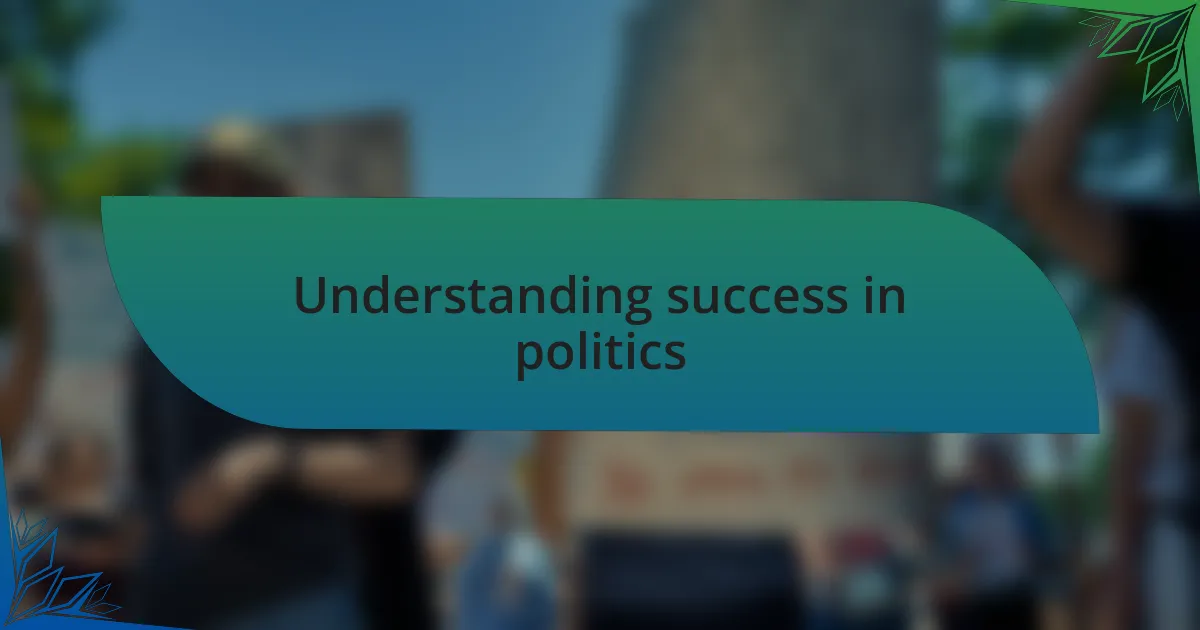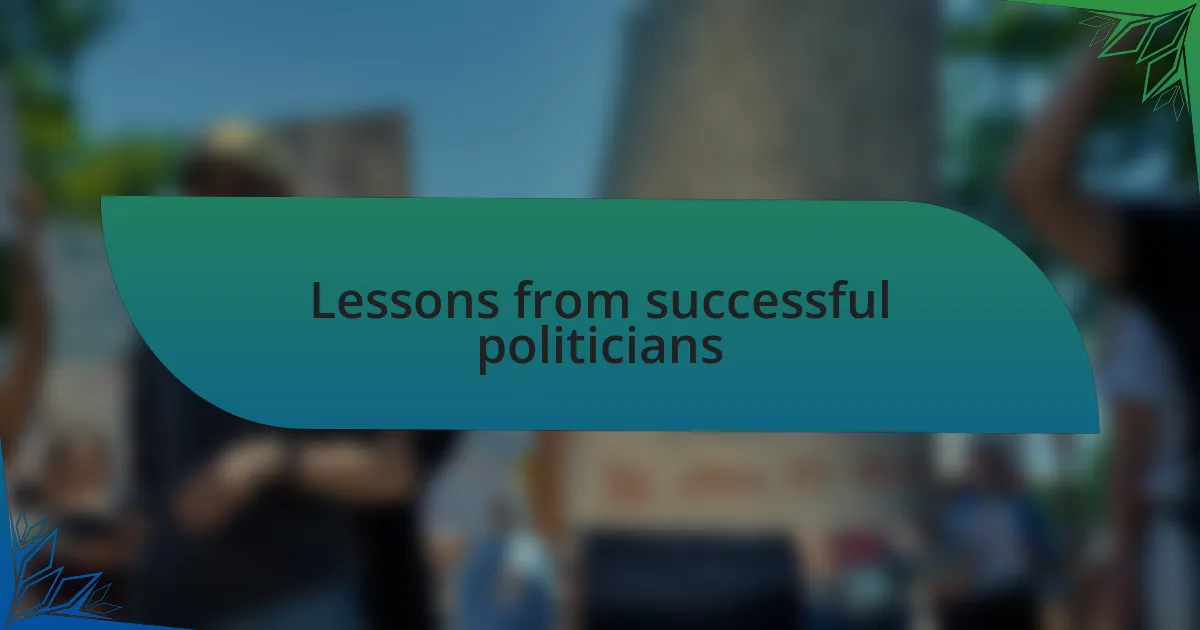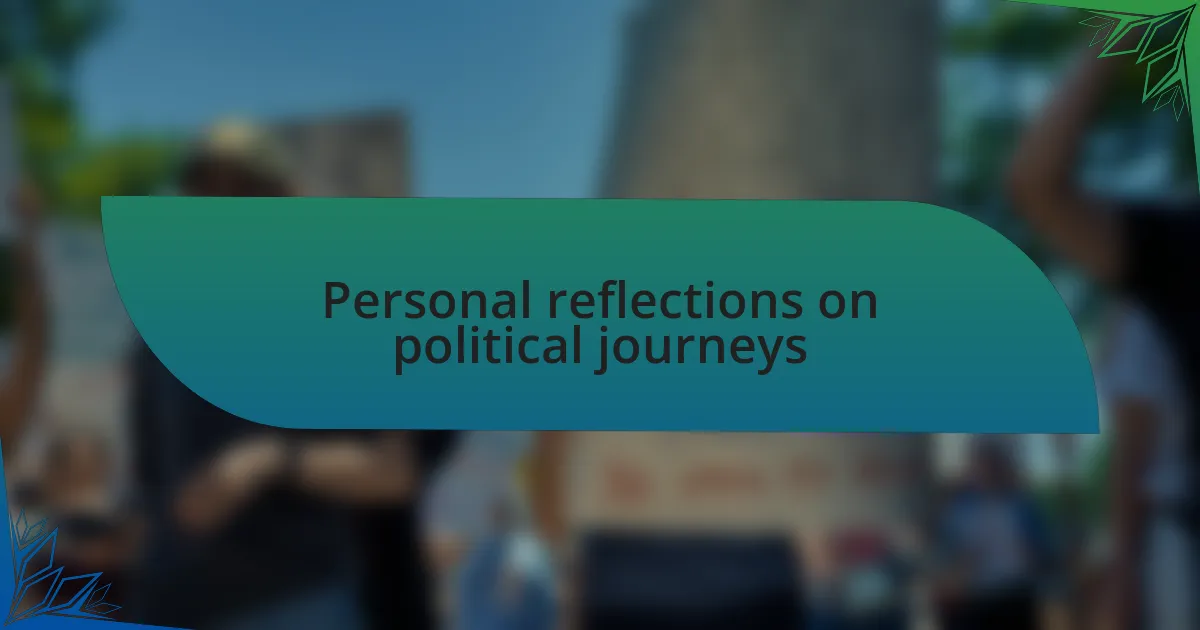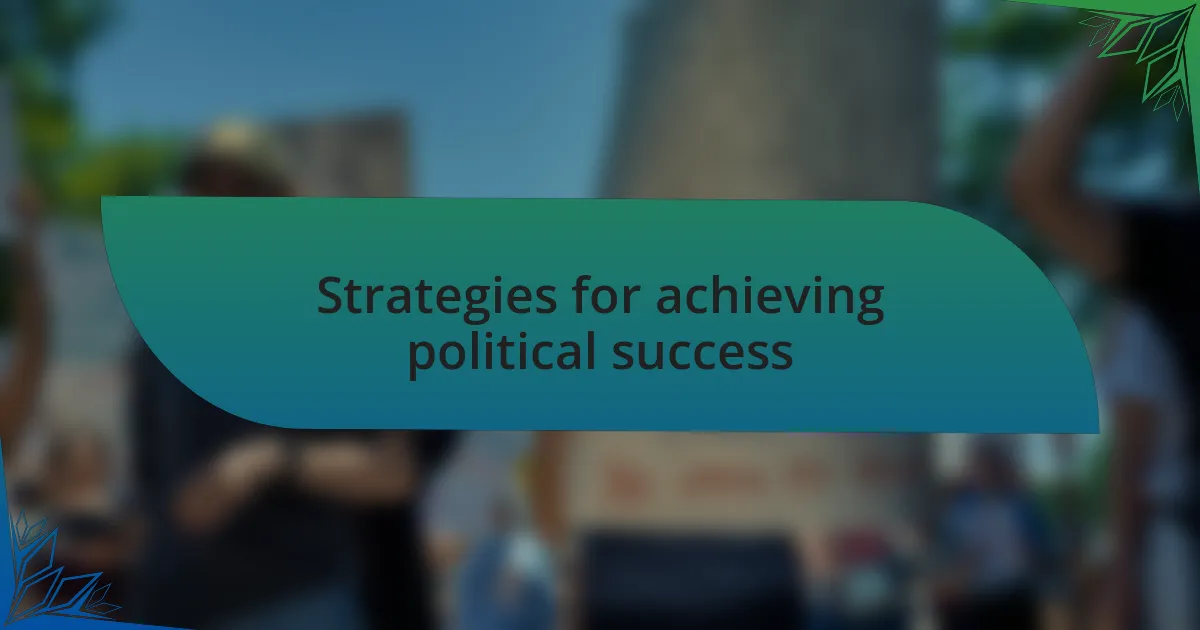Key takeaways:
- Success in politics is measured not just by election victories but also by authentic connections and lasting influence within the community.
- Effective communication, particularly through personal storytelling, helps build emotional bonds with voters and enhances trust.
- Public perception plays a crucial role; a single misstep can significantly alter a candidate’s reputation and support.
- Resilience and adaptability are essential traits for politicians, enabling them to overcome setbacks and pivot strategies in response to changing sentiments.

Understanding success in politics
Success in politics often feels like a moving target. I remember during an election cycle, observing a candidate who seemed to resonate with voters on a heartfelt level, yet they lost significantly because their policies didn’t line up with the public’s needs. This made me reflect: is success measured solely by winning elections, or is it also about lasting influence and connection with the community?
I’ve found that effective politicians are those who not only articulate their vision but also listen actively to their constituents. Success isn’t just about the podium moment—it’s about the quieter, diligent conversations that happen behind the scenes. Have you ever considered how a small town hall meeting can propel a candidate’s reputation more than a million-dollar ad campaign?
Moreover, genuine success in politics requires resilience. I’ve seen many promising leaders face setbacks that would deter others, yet their ability to rise and adapt is what ultimately sets them apart. Isn’t it fascinating how flexibility combined with a steadfast belief in one’s principles can turn adversity into a stepping stone for greater achievements?

Key factors of political success
The ability to connect authentically with people is perhaps one of the most crucial factors driving political success. I recall attending a community forum where a candidate shared a personal story about their own struggles with healthcare—suddenly, the audience didn’t see a politician but rather someone who understood their pain. That emotional bond can ignite support in ways that policy papers often can’t.
Another key factor is adaptability, which is evident when leaders pivot their strategies in response to changing voter sentiments. I remember during a heated debate on education reform, one candidate quickly adjusted their stance after hearing nuanced concerns from parents. This not only showcased their attentiveness but also built trust, highlighting that being receptive can turn potential pitfalls into opportunities for deeper engagement.
Moreover, the role of a strong narrative cannot be overstated. A compelling story of one’s journey or mission can differentiate a candidate in crowded races. I once met a politician whose campaign centered on their family’s immigrant story—this narrative resonated widely, galvanizing support across diverse demographics. It’s a powerful reminder that in politics, the stories we tell can shape perceptions and ignite movements.

The role of public perception
Public perception is like the air in a balloon; it shapes and propels a candidate’s journey in politics. I remember attending a rally where the energy shifted dramatically when the candidate engaged with the crowd, genuinely seeking their opinions on pressing issues. Suddenly, the atmosphere transformed—people were no longer spectators but active participants, reinforcing my belief that public perception can be a powerful driver of support.
It’s fascinating how a single misstep can alter public perception overnight. Take, for example, a prominent figure who faced backlash for seemingly dismissive comments during a town hall meeting. I recall the palpable tension in the room; it was as if the air had been sucked out. The fallout from that moment illustrates how quickly public trust can erode, reminding us that perception isn’t just influenced by policies but also by personal interactions and reactions.
Ultimately, understanding public sentiment is vital for any political figure. I often find myself pondering how leaders could better anticipate shifts in perception. Through listening closely and engaging authentically, they can navigate this complex landscape. As I reflect on my observations, I’m convinced that those who fully grasp and connect with public perception are often the ones who find enduring success in the political arena.

Lessons from successful politicians
Success in politics often hinges on the ability to communicate a vision effectively. I remember a campaign where one candidate shared personal stories about their upbringing, providing a relatable context for their policies. It struck me that authenticity resonates deeply with voters; when politicians share their own vulnerabilities, it creates a bond that can foster trust and loyalty. Doesn’t it make you wonder how many of today’s leaders are missing that crucial connection?
Effective listening is another lesson I’ve gleaned from successful politicians. I once attended a town hall where the elected official took the time to address each question thoughtfully. It was refreshing to see someone not just speak at the audience but genuinely engage with their concerns. This approach not only builds rapport but also empowers constituents, reinforcing the idea that their voices truly matter in the political landscape.
Finally, resilience stands out as a key characteristic among successful political figures. In my observations, many have faced significant setbacks—scandals, lost elections, or harsh criticisms. Yet, those who managed to bounce back often did so by owning their mistakes and pivoting their strategies. It prompts me to reflect: how do we cultivate our own resilience in the face of adversity? It’s a valuable trait not just for politicians but for anyone aiming to make a meaningful impact.

Personal reflections on political journeys
Reflecting on my own political journey, I often think about the moments that shaped my beliefs and aspirations. I once volunteered for a grassroots campaign where I met a candidate who truly embodied the spirit of change. Watching that individual engage with community members, it left me with a profound understanding of how pivotal personal connections are in politics. Have you ever considered how those early experiences influence your path?
Another significant takeaway for me is the importance of growth through failure. Early in my involvement, I faced a setback when my proposal for a local initiative was rejected. It felt disheartening at the time, but it taught me to embrace constructive criticism and refine my ideas. Isn’t it fascinating how moments that sting at first can become stepping stones to improvement?
Moreover, navigating the diverse political landscape has opened my eyes to the value of empathy. I recall a poignant discussion with a fellow activist who had vastly different views. As we shared our stories, I found that understanding another’s perspective can soften the sharp edges of disagreement. Wouldn’t it be incredible if every political conversation prioritized empathy over rhetoric?

Strategies for achieving political success
One strategy for achieving political success that I’ve learned through experience is the art of strategic networking. I remember a pivotal moment at a local political event where I took the opportunity to introduce myself to seasoned politicians and community leaders. That simple conversation led to invitations to exclusive discussions and collaborations, proving that building relationships often unlocks doors that formal qualifications cannot.
Another crucial element is crafting a compelling narrative about your platform. I’ve seen firsthand how stories resonate more powerfully than statistics. During a campaign, I shared a personal story about my family’s struggle with healthcare access. The response was overwhelming; it connected with voters on an emotional level, making my messaging more relatable. Have you found that authenticity in storytelling can inspire others to take action?
Staying adaptable in the face of change is also vital in politics. I recall a turning point when a sudden shift in public opinion forced our campaign to reevaluate its strategy completely. Embracing that pivot not only kept us relevant but also allowed room for innovative ideas to flourish. Isn’t it interesting how flexibility can lead to unexpected opportunities for growth?